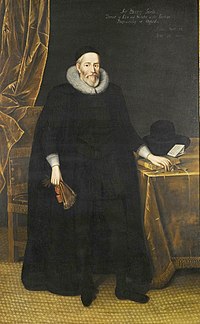
The position of Savilian Professor of Geometry was established at the University of Oxford in 1619.[1] It was founded (at the same time as the Savilian Professorship of Astronomy) by Sir Henry Savile, a mathematician and classical scholar who was Warden of Merton College, Oxford, and Provost of Eton College, reacting to what has been described by one 20th-century mathematician as "the wretched state of mathematical studies in England" at that time.[2] He appointed Henry Briggs as the first professor. Edward Titchmarsh (professor 1931–63) said when applying that he was not prepared to lecture on geometry, and the requirement was removed from the duties of the post to enable his appointment, although the title of the chair was not changed. The two Savilian chairs have been linked with professorial fellowships at New College, Oxford, since the late 19th century. Before then, for over 175 years until the middle of the 19th century, the geometry professors had an official residence adjoining the college in New College Lane.
There have been 20 professors; Frances Kirwan, the current (as of 2020[update]) and first female holder of the chair, was appointed in 2017. The post has been held by a number of distinguished mathematicians. Briggs helped to develop the common logarithm, described as "one of the most useful systems for mathematics".[3] The third professor, John Wallis, introduced the use of ∞ for infinity, and was regarded as "one of the leading mathematicians of his time".[4] Both Edmond Halley, who successfully predicted the return of the comet named in his honour, and his successor Nathaniel Bliss held the post of Astronomer Royal in addition to the professorship. Stephen Rigaud (professor 1810–27) has been called "the foremost historian of astronomy and mathematics in his generation".[5] The life and work of James Sylvester (professor 1883–94) was commemorated by the Royal Society by the inauguration of the Sylvester Medal; this was won by a later professor, Edward Titchmarsh. Two professors, Sylvester and Michael Atiyah (professor 1963–69), have been awarded the Copley Medal of the Royal Society; Atiyah also won the Fields Medal while he was professor.
- ^ Wilson, Robin, ed. (2022). Oxford's Savilian Professors of Geometry: The First 400 Years. Oxford University Press. ISBN 978-0198869030.
- ^ Cite error: The named reference
Maths1was invoked but never defined (see the help page). - ^ Cite error: The named reference
Briggswas invoked but never defined (see the help page). - ^ Cite error: The named reference
Walliswas invoked but never defined (see the help page). - ^ Cite error: The named reference
Rigaudwas invoked but never defined (see the help page).